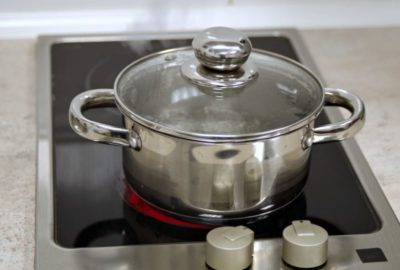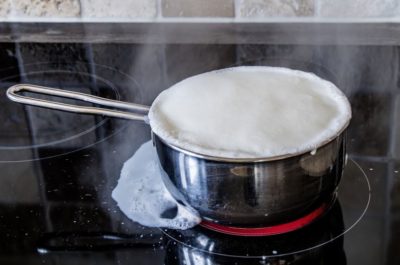
Keep my vacation Kosher
Q. I’d like to ask the Rav two questions.
I went away on vacation with my family and we rented an apartment with a kitchenette. The owner is not Jewish, so obviously the entire kitchenette area is not kosher.
My first question is: I accidentally put down a container full of boiling hot soup on the “treife” countertop. Does that create any halachic problem for me to eat the soup?
Secondly, I’d like to know if I may use the grates on the stovetop, to cook upon, as they’re certainly treif as well.
A. It’s interesting to note that the answer to both questions is actually based on the same premise.
Treif Utensils
We know that one cannot use “treife” utensils with kosher food unless the utensils are “kashered”; the reason is because, for instance, when a pot is used to cook “treife” food, “b’lios” (taste particles) of the “treife” food enter the walls of the utensil, making the pot “treife”.
Afterwards, if one cooks kosher food in that pot, the non-kosher “b’lios” in the “treife” pot will be transferred to the kosher food, rendering the food not kosher, as well.
It needs to touch the utensil

This halacha applies only to actual food that touches a “treife” utensil. If kosher food is in a kosher utensil, and the kosher utensil touches a non-kosher utensil, “b’lios” cannot be transferred from one utensil to another without a medium of some moisture between the utensils.
As a result, a piping hot fleishig pot containing meat that touches a piping hot milchig pot containing milk, remain kosher (both pot and contents ) as long as there is no liquid on the outside of the pots at their point of contact [See Yoreh Deah 92:8].
Thus, in the case of the hot container of soup being put down on the “treife” counter, since there was no liquid on the counter or the container to transfer “blios” between the counter and the container, the soup remains perfectly kosher.
[The truth is, in this particular case, even if there was liquid on the countertop there are several other reasons to be matir the soup as well. One simple reason is as long as we do not know that the countertop was used with actual hot “treife” food within the last 24 hours, the countertop is technically kosher; in almost all circumstances any “b’lios” that were absorbed in a kli more than 24 hours before, are considered “pagum” – something whose taste is defective, and do not forbid the eating of kosher food into where these pagum b’lios were transferred. The halachic term for such a utensil that has b’lios that are more than 24 hours old is called an “aino ben yomo”. ]
Same for the Grates
Likewise, regarding the use of “treife” stovetop grates, or similarly, using the same stovetop grates in a kosher home for both milchig and fleishig, if the grates are clean and there’s no spillage from the pan or pot that’s on the fire to serve as a medium between the grates and the utensil on the grate, then there is no way for the b’lios in the grates to forbid the pan or pot on the flame.
For this reason Rav Moshe Feinstein zt”l paskens that one may use the same stovetop grates for both milchig and fleishig cooking, provided that the grates are clean. [See Igros Moshe YD 40 & 59 and Ig”M OC 124].
Wishing you and your family an enjoyable and “kosher”vacation.